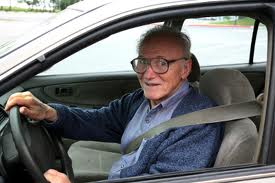More and more Americans are outliving their ability to drive safely. As a result of impairments in three functions that are important for driving – vision, cognition and motor function – older drivers have a higher crash risk than middle aged adults.
To address this issue, many states have enacted laws that contain specific licensing requirements for older drivers. Right now 33 states and the District of Columbia have special provisions for mature drivers.
Missouri rules for older drivers
- License renewed: Every 6 years for those under age 70; every 3 years for those 70 and older.
- Renewal conditions: In person.
- Vision test: Yes.
- Written test: No (unless license has been expired for more than 6 months or a review process indicates).
- Road test: No (unless license has been expired for more than 6 months or a review process indicates).
Illinois rules for older drivers
- License renewed: Every 2 years for those 81 to 86 years, and every year for those 87 and older. Every 4 years for those under age 81.
- Renewal conditions: For those under 75 with a clean driving record and no medical report (based on physician or community member filing a report questioning driving ability or physical or cognitive skills), mail-in, telephone, or online renewal available every other cycle.
- Vision test: Yes.
- Written test: Every 8 years if traffic convictions have occurred.
- Road test: Yes, for those 75 and older.
Driving is a complicated task. It requires people to see and hear clearly; pay close attention to other cars, traffic signs and signals, and pedestrians; and react quickly to events. Drivers must be able to accurately judge distances, speeds, and monitor movement around them.
It’s common for people to have declines in visual, thinking, or physical abilities as they get older. As a result, older drivers are more likely than younger ones to have trouble in certain situations, including making left turns, changing lanes, and navigating through intersections.
Common mistakes of older drivers include:
- failing to yield the right of way
- failing to stay in lane
- misjudging the time or distance needed to turn in front of traffic
- failing to stop completely at a stop sign
- speeding or driving too slowly.
The Self-Assessment
We all age differently. For this reason, there is no way to set one age when everyone should stop driving. So, how do you know if you should stop? Perhaps the best indicator is a self-assessment of your driving abilities and your overall health.
Driving ability – ask yourself these questions:
- Do other drivers often honk at me? Have I had some accidents, even if they are only “fender benders”?
- Do I get lost, even on roads I know?
- Do cars or people walking seem to appear out of nowhere?
- Have family, friends, or my doctor said they are worried about my driving?
- Am I driving less these days because I am not as sure about my driving as I used to be?
- Do I have trouble staying in my lane?
- Do I have trouble moving my foot between the gas and the brake pedals, or do I confuse the two?
Health & Medications:
Some health problems can make it harder for people of any age to drive safely. But other conditions that are more common as you get older can also make driving difficult. For example, Parkinson’s disease, stroke, and arthritis can interfere with your driving abilities. Additionally, people with Alzheimer’s or other types of dementia may forget how to drive safely. They also may forget how to find a familiar place like the grocery store or even home. It is important to tell a family member or doctor if you become confused while driving.
Do you take any medicines that make you feel drowsy, light-headed, or less alert than usual? Medications can have side effects. People tend to take more medicines as they age, so pay attention to how these drugs may affect your driving.
- Read the medicine labels carefully, and pay attention to any warnings.
- Make a list of all your medicines, and talk to a doctor or pharmacist about how they may affect your driving.
- Don’t drive if you feel light-headed or drowsy. Sometimes it is easier for an older adult to first accept driving limitations versus giving up driving all together.
Setting Limitations
Sometimes it is easier for an older adult to first accept driving limitations versus giving up driving all together. After the above assessment, you may determine that you can still drive safely with certain limitations, such as:
- Avoid driving at night or during inclement weather.
- Look for different routes that can help you avoid places where driving can be a problem. You could plan routes to where you want to go so that you only need to make right turns.
- Have your driving skills checked. There are driving programs and clinics that can test driving ability and also make suggestions on improving driving skills.
- Update your driving skills by taking a driving refresher course. Some car insurance companies may even lower your premium when you pass this type of class.
Hanging Up the Keys
If a self-assessment reveals dangerous driving habits or a medical condition that is impairing your ability to drive safely, then it may be time to give up the keys.
Adjusting to life without a car may be challenging. Most likely you’ve been driving your whole life and it feels like quite a shock. It’s normal to be frustrated, angry, or irritable. You might even feel ashamed or worry that you are losing your independence. However, it takes a lot of courage to stop driving and put the safety of yourself and others first. You may also find there are many benefits to living without a car, such as:
- Save money on the cost of car ownership, including car insurance, maintenance, registration, and gasoline. These savings can pay for alternative transportation if necessary.
- Improve your health. Giving up the car keys often means walking or cycling more, which can have a hugely beneficial effect on your health. And not only is exercise good for your body—it’s good for your mind, mood, and memory.
- Expand your social circle. While many seniors have difficulty accepting ride offers from others, this can be a good time to reach out and connect to new people. You can offer a friend money for gas, or trade off on other chores, such as cooking a meal in return for your friend driving.
- Appreciate the change of pace. For many, stopping driving means slowing down. While that may not sound appealing to everyone, many older adults find that they actually enjoy life far more when they live it at a slower pace.
The more alternatives you have to driving, the easier the adjustment will be. You want to make sure that you can get out not only for essentials like doctor’s appointments, but also social visits and enrichment. Feeling housebound can quickly lead to depression.
- Public transportation. Check your local public transportation options and ask about reduced prices for older adults.
- Ride sharing. Family members, friends, and neighbors may be a resource for ride sharing. Offer to share the costs or to return the favor in a different way, such as cooking a meal or helping with yard work.
- Community shuttles/senior transit. Your local community or place of worship may have shuttle service available, especially for medical appointments.
- Taxis or private drivers. Taxis may be a good option for quick trips without a lot of prior scheduling. You can also look into hiring a chauffeur or private driver.
- Walking/cycling. If health permits, walking or cycling when you can is a great way to not only get around but also get some exercise.
- Motorized wheelchairs. Motorized wheelchairs can be a good way to get around if you live in an area with easily accessible stores and well-paved streets.









